Autumn Statement 2022 latest LIVE: Chancellor Jeremy Hunt unveils £55bn of spending cuts and tax rises
- Oops!Something went wrong.Please try again later.
Jeremy Hunt has unveiled his Autumn Statement of tax hikes and spending cuts in the House of Commons.
The package represents a significant change from his predecessor Kwasi Kwarteng's unfunded tax cuts in the disastrous mini-budget less than two months, ago which was widely blamed for having spooked the markets.
The Chancellor, in his opening statement said: “In the face of unprecedented global headwinds, families, pensioners, businesses, teachers, nurses and many others are worried about the future. So today we deliver a plan to tackle the cost-of-living crisis and rebuild our economy. Our priorities are stability, growth, and public services.”
Shadow chancellor Rachel Reeves said “the mess we are in is the result of 12 weeks of Conservative chaos but also 12 years of Conservative economic failure".
Follow the latest updates below
Live coverage ends
15:29 , Josh Salisbury
Thank you for joining us for our live coverage of the Autumn Statement.
To recap, the Chancellor froze a range of tax thresholds, hitting the wealthy hardest, as part of moves to raise some £24 billion and scaled back the energy bills support package from April.
He also announced around £30 billion of spending cuts.
It comes as the fiscal watchdog, the OBR, said the UK was in a recession, which would last around a year - and warned this year would see the biggest fall in living standards since its records began.
In a dire warning, it said the drop in household spending power over the next two years will effectively wipe out the past eight years of growth.
In a bid to provide some support, Mr Hunt announced some measures to help the most vulnerable in society, and some extra short-term funding for the NHS, schools and social care.
For a breakdown of the main points in today’s announcement, read our full story here.
Lack of support for renters means ‘homelessness will rise this winter’ - charity
15:11 , Josh Salisbury
A lack of support for renters has left a ‘housing hole’ at the centre of the budget - meaning homelessness will rise this winter, a leading charity has warned.
Polly Neate, chief executive, Shelter, said: “There is a housing hole in this budget - housing benefit remains frozen at 2020 levels when private rents have been rising at record rates.
“Increasing Universal Credit will really help people struggling to pay their food and fuel bills, but crucially it doesn’t cover rents which are most people’s biggest outgoing. Unless housing benefit is increased, the shortfall with real rents will only grow - swallowing up other benefit increases. The boost to benefits will be built on quicksand.
“The glimmer of hope for those at the sharp end of the housing emergency is the planned increase to the benefit cap. Raising the cap will put more money in the pockets of the hardest hit families.
“The government’s refusal to unfreeze housing benefit ignores the rental crisis that is unfolding, and means that homelessness will continue to rise this winter.”
Chancellor criticised over lack of online sales tax in statement
14:57 , Josh Salisbury
The Chancellor has been criticised by some for not including a tax for online retailers in his statement.
The chief operating officer of Westfield UK, which runs two shopping centres in Stratford and Shepherd’s Bush, said it was a “major missed opportunity”.
“Physical retailers pay significantly more in taxes as well as being faced with rising operational costs, while online retailers continue to be let off the hook,” said Scott Parsons.
Meanwhile, the leader of Labour-run Westminster Council also called for the measure. Cllr Adam Hug said it would “redress the absurd advantage” some online retailers have verus high street retailers.
232,000 extra people hit with top rate of tax - Treasury
14:42 , Josh Salisbury
An extra 232,000 people will be paying the top rate of income tax from April, according to the Treasury.
In his Autumn Statement, the Chancellor cut the threshold upon which 45% is paid from £150,000 to £125,140.
This means the proportion of income over £125,140 will be taxed at 45%.
Limited headroom in Hunt’s plan, says OBR
14:33 , Josh Salisbury
The plans unveiled today leaves very little room for manouvre, the fiscal watchdog, the OBR, has suggested.
In his announcement, Mr Hunt set out two new fiscal ‘rules’: underlying debt must fall as a percentage of GDP by the fifth year of a rolling five-year period, and that public sector borrowing must be below 3% of GDP.
But the OBR said “interest rates would need to be just 0.4 percentage point higher to wipe out" the £9.2 billion margin by which debt must fall in the final year of the forecast to meet the fiscal rule.
However it also adds: “But equally, a fall of just 0.4 percentage points would double the Chancellor’s headroom relative to our central forecast”.
95% of local authorities expected to hike council tax by 5%
14:18 , Lydia Chantler-Hicks
Local authorities will now be able to raise council tax by 5% without holding referendums, with the Treasury estimating that 95% will hike rates by the maximum amount.
This is an increase from the current 3% levy, with the new total being comprised of 3% in general council tax and 2% for the adult social care precept.
Tory MP warns raising tax for businesses and workers risks ‘stifling growth’
14:10 , Lydia Chantler-Hicks
A Conservative MP has warned that raising taxes on both businesses and hard-working people risks “stifling” growth and productivity.
Richard Drax, who represents the South Dorset constituency, told the Commons: “I have huge sympathy for my right honourable friend. We are facing severe financial challenges for the reasons he explained so well.
“But both sides of the House are promising to spend billions and billions more pounds. Can I just remind the House that it is the private sector and hard-working people through their taxes that pay for Government expenditure?
“So will my right honourable friend agree with me that raising taxes on both risks stifling the growth and productivity that he and I both want?”
Chancellor Jeremy Hunt replied: “He is right to make the case for a lightly taxed dynamic economy and I would like to bring taxes down from their current level.
“I think we are faced with the necessity to do something fast to restore sound money and to bring inflation down from 11% which is why we’ve made difficult decisions today but yes, he is absolutely right, there is no future for this country unless we get back on the path to being a lower taxed economy.”
Hundreds of thousands of people to pay higher income tax under new economic plan
14:05 , Lydia Chantler-Hicks
An extra 92,000 people will be paying tax above the personal allowance and 130,000 will be paying the higher rate of income tax in 2027/28, according to Treasury analysis.
Figures are yet to be provided on how many more people will be paying the top rate of income tax.
Chancellor rejects Jeremy Corbyn’s suggestion of introducing rent controls
14:02 , Lydia Chantler-Hicks
The Chancellor said he was “not a fan of rent controls” when asked to consider them by Labour former leader Jeremy Corbyn.
Islington North MP Mr Corbyn told the Commons: “Raising the local housing allowance merely in line with inflation doesn’t necessarily help many people on benefits living in the private rented sector, particularly in constituencies like mine where generally speaking many of those people end up being exported away from the area that they live in.

“What is more important is actually giving local authorities the power to introduce rent controls in areas of very high private sector rent. It is the biggest problem that many, particularly young people, face in their lives.”
Jeremy Hunt replied: “I am not a fan of rent controls because I am worried that that would reduce the supply of housing to the private rented sector.
“But I would point to him that we lifted the local housing allowance during the pandemic to help people, and we are keeping it at that higher level.”
More than half of households expected to be worse off under new fiscal plan
13:58 , Lydia Chantler-Hicks
The autumn statement will see around 55% of households worse off, according to a Treasury analysis.
It comes after Jeremy Hunt announced a raft of tax rises and spending cuts in his Autumn Statement today.
UK ‘just not very good’ at infrastructure projects, admits Chancellor
13:53 , Lydia Chantler-Hicks
The Chancellor conceded the UK is “just not very good” at completing infrastructure projects after he was asked about HS2.
Jeremy Hunt’s comments came after Conservative MP Sir William Cash asked him to “explain how it is that HS2 will continue beyond Birmingham with a verifiable cost of at least £40 billion when every independent report on HS2 condemns the project and confirms that Phase 2 will make the real services to all West Coast destinations north of Birmingham much worse.”
Mr Cash added: “And I do ask him to make the very clear commitment to keep this matter under review at all costs is in the national interest?”
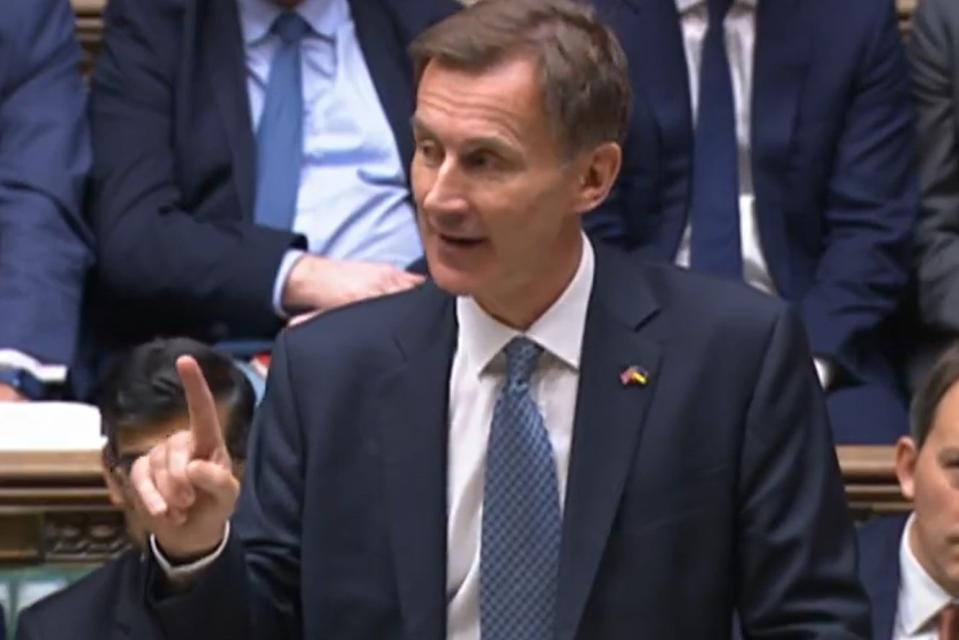
Mr Hunt replied: “He is right that the increases in budget for HS2 are disappointing but I think a strong economy needs to have consistency of purpose and that means saying that we will make sure that we are a better connected country and the lack of those connections is one of the fundamental reasons for the differences in wealth between north and south which we are so committed to addressing.
“What I would say to him is there is a bigger issue about the way that we do infrastructure projects: it takes too long, budgets therefore get out of control and we’re just not very good at it and we have to sort it out.”
Vulnerable people are going to die without urgent help, warns disabled widower
13:48 , Lydia Chantler-Hicks
A disabled widower forced to sell his late wife’s possessions to cover his living costs has warned “people are going to die” unless urgent help is given to the vulnerable following Jeremy Hunt’s autumn statement.
Jason Alcock, 51, has autism, ADHD and bipolar disorder and uses technology to communicate from his home, but has had to “completely change” the way he lives to be able to pay his energy costs in recent years.
“We need it now,” Mr Alcock, from Stoke-on-Trent, said of Mr Hunt’s £900 cost-of-living payment for those on benefits.
“We’re going to have a really cold winter and people are going to die because they’re not going to turn on their heating.
“I’m living in one room upstairs because the heat rises…That’s the only room I’m heating.
“I’ve heard of friends who, when their children go to bed at seven o’clock at night, they turn off the heating…This shouldn’t be happening for anyone.”
‘This isn’t what the British public voted for’, says Lib Dem MP
13:41 , Lydia Chantler-Hicks
Lib Dem Treasury spokesperson Sarah Olney told the Commons: “This cost of chaos budget will cause untold pain for everyone.
“Soaring mortgages, unfair tax hikes and further cuts to our struggling public services, this Conservative Government has plunged the economy into chaos and now they are forcing ordinary families to pay for their incompetence.
“For an average family this will mean thousands of pounds in increased taxes and bills, and yet their local services are being cut while their real-terms pay is decreasing.”
“Who voted for this? Because it certainly wasn’t the British people,” she said.
Chancellor Jeremy Hunt said the Office for Budget Responsibility confirmed that “because of the decisions we have taken inflation will be lower and that means less pressure on interest rates and less pressure on mortgages”.
He said: “This country voted for a Conservative Government because they know that we will take the tough and difficult decisions.”
Health spending ‘not enough to keep NHS standing still’ says Public Account Committee chair
13:36 , Lydia Chantler-Hicks
The Chancellor’s announcement on health spending was “not even Osborne-esque funding for the NHS”, the Labour MP who chairs the Public Accounts Committee said.
Labour former minister MP Dame Meg Hillier said: “The Chancellor has unveiled large numbers, or numbers that seem large. But let’s be clear, take the NHS that £3.3 billion a year is not even Osborne-esque funding for the NHS.
“It is not enough to keep the NHS standing still. Will he level with us and tell us what percentage of the NHS budget it is?”
Jeremy Hunt referenced the Parliament of 2010 to 2016 when George Osborne was Chancellor, and said: “I apologise to her… for not being able to do that kind of maths in my head. But I can tell you that in that period the NHS budget went up by 0.1% a year, and this is a lot more than that.”
Theresa May praises Chancellor’s ‘commitment to sound public finances’
13:33 , Lydia Chantler-Hicks
Conservative former Prime Minister Theresa May commended the Chancellor and the Government “for their commitment to sound money”.
She said: “Can I welcome and commend my right honourable friend and the Government for their commitment to sound money and sound public finances.”
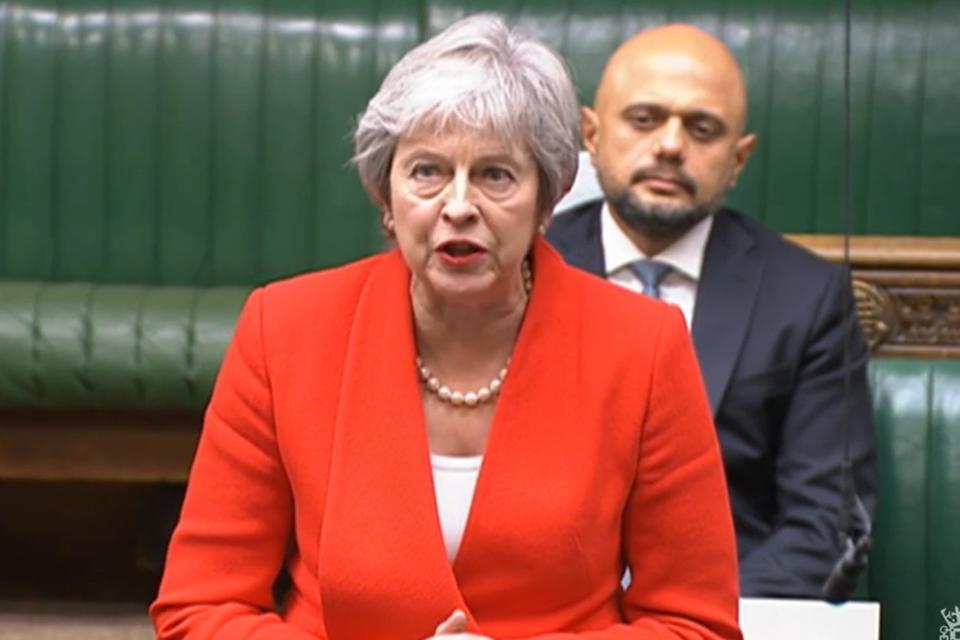
She welcomed the commitment to “innovation and R&D” [research and development], saying: “But could I ask him to go further and to look again at the definition of what qualifies for R&D for tax credits? I think there is more that can be done to boost our economy for the future.”
Chancellor Jeremy Hunt said: “We are looking at all the taxes around R&D relief. We want to encourage it. There has been a certain amount of abuse.
“But we particularly want to encourage it amongst small companies who often can be the most innovative.”
Tories ‘always back families’, says Hunt
13:28 , Lydia Chantler-Hicks
The Chancellor said Conservatives “always back families” as the SNP blamed the nation’s economic troubles on Brexit and austerity.
SNP Treasury spokeswoman Alison Thewlis told MPs: “I want to come to the policy that unites all the unionist parties in this House: Brexit. Tories, Labour, the Lib Dems, all Brexiteers now, truly committed to this futile project of deliberate self-destruction.”
She added: “Scotland did not vote for this. We did not choose austerity and we did not choose Brexit.
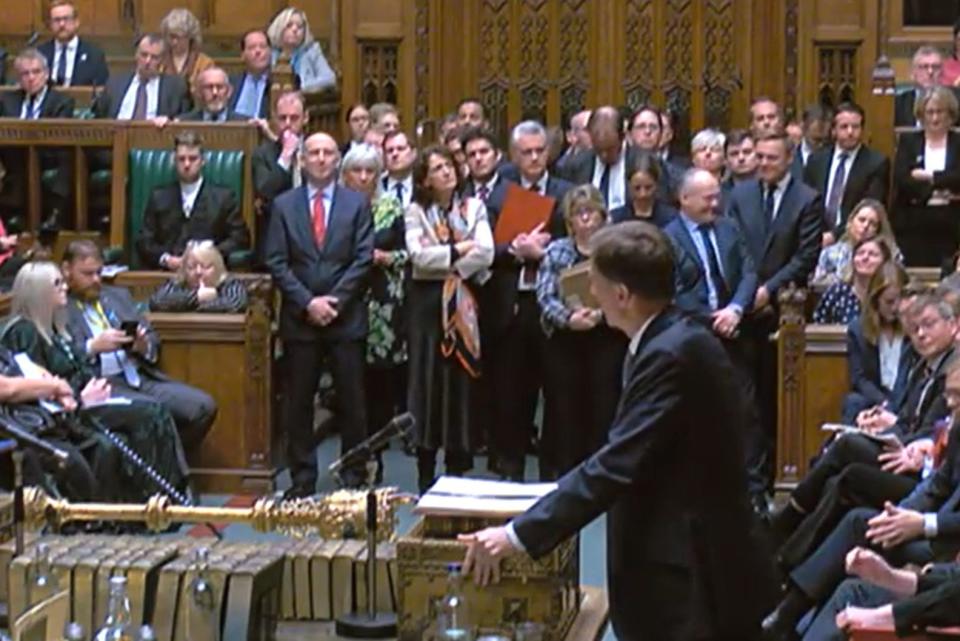
“The OBR say that living standards are to fall by 7% over the next two years. It ought to be of no surprise to anybody that just shy of half of Scots think the UK won’t exit in its current form in the next five years.
“This is a UK so weak that no-one would wish to join it. Scotland cannot be forced to stay in broke, broken, Brexit Britain.”
Jeremy Hunt replied: “I understand that separation means more to her than anything else in politics but families in Scotland today heard other things. They heard £600 million for the Scottish NHS, £385 million for schools, over £4 billion to help Scottish families with their energy bills.”
He added: “That is because we are more than neighbours, we are family, and Conservatives always back families.”
Pound falls as long recession period looms
13:23 , Lydia Chantler-Hicks
The pound has fallen against the US dollar as investors appear concerned over the prospects of a lengthy recession and fears Chancellor Jeremy Hunt’s austerity budget will compound the economic woes.
Sterling dropped nearly 1% to 1.18 US dollars and was 0.3% lower at 1.14 euros.
On the London market, the FTSE 100 Index was 0.7% lower at 7300.4.
Labour slams Tory plan as ‘higher taxes, inflation and mortgages'
13:09 , Josh Salisbury
Labour shadow chancellor Rachel Reeves has summed up the Autumn Statement as “more taxes, more inflation, higher mortgages".
She said: "Instead of tricks and stealth taxes, why don't they have a proper economic plan for Britain that puts working people at their hearts?"
Conservatives shouted: "Where's yours?"
Ms Reeves continued: "Why do they refuse to have a real industrial strategy that gives business certainty, unlocks investment and means that Britain can once again lead the world in the industries of the future?"
Ms Reeves had earlier compared the government to “pickpockets”, saying they had forced the country into a “doom loop” of low growth, high taxes and high inflation.
"This Government has forced our economy into a doom loop where low growth leads to higher taxes, lower investments and squeezed wages, with the running down of public services - all of which hits economic growth again,” she said.
OBR forecasts highest sustained tax burden for seven decades
13:05 , Josh Salisbury
Other key predictions and assessments in the OBR’s forecasting include:
- Inflation is to peak at 40-year high of 11.1% this quarter, but would have been 2.5% points higher without Government energy bills support.
- House prices forecast to drop by 9% over the next 2 years and remain below their current level over the next five years.
- Markets expect Bank rate to peak at 5 per cent in the second half of 2023
- Tax burden to peak above 37% of GDP in 2023-24 and remain near that peak, in the highest sustained level in seven decades
OBR: UK in recession and it will last a year
12:53 , Josh Salisbury
The OBR has also said the UK is in recession and predicts it will last a year.
GDP is expected to fall by 2%.
Although this is a shorter recession that predicted by the Bank of England, it means the economy will not recover to its pre-pandemic size until late 2024.
“The real incomes squeeze tips the economy into a recession lasting just over a year,” says the fiscal watchdog.
“GDP falls by 2%, doesn’t return to its pre-pandemic level until late 2024, and cumulative growth is over 3ppts lower by 2027 than we forecast in March.”
The real incomes squeeze tips the economy into a recession lasting just over a year. GDP falls by 2%, doesn’t return to its pre-pandemic level until late 2024, and cumulative growth is over 3ppts lower by 2027 than we forecast in March.#AutumnStatement pic.twitter.com/xPZOmA1tpP
— Office for Budget Responsibility (@OBR_UK) November 17, 2022
OBR: Eight years of growth lost in living standards drop; half a million to lose their jobs
12:49 , Josh Salisbury
As the Chancellor sat down, the fiscal watchdog the Office for Budget Responisbility published its forecasts - and they make for grim reading.
The OBR predicts this year will see the biggest fall in living standards on record, with real incomes per person dropping by 7% over two years. This fall in living standards to 2023-24 wipes out eight previous years of growth.
It predicts more than half a milluon people will lost their jobs.
“Rising prices erode real wages and reduce living standards by 7% in total over the two financial years to 2023-24 (wiping out the previous eight years' growth), despite over £100 billion of additional Government support.
“The squeeze on real incomes, rise in interest rates, and fall in house prices all weigh on consumption and investment, tipping the economy into a recession lasting just over a year from the third quarter of 2022, with a peak-to-trough fall in GDP of 2%.
"Unemployment rises by 505,000 from 3.5% to peak at 4.9% in the third quarter of 2024.”
Labour: Conservatives can ‘never again’ claim to be party of economic competence
12:37 , Josh Salisbury
Labour’s Rachel Reeves is now responding to the Autumn Statement.
She says “the mess we are in is the result of 12 weeks of Conservative chaos but also 12 years of Conservative economic failure".
She tells MPs that the reason that we are having spending cuts and tax rises is because of the “kamikaze of the mini budget”.
“What does the Chancellor have to offer today? More of the same, with working people paying the price for his failure,” she says. “The Chancellor should have come here today to ask for forgiveness, at the very least he could have offered an apology, but no.
“Instead he says that his predecessor was correct in his analysis at the mini-budget, the mini-budget that put our economy into freefall.
“All the country got today was an invoice for the economic carnage that this Government has created.
“Never again can the Conservatives be seen as the party of economic competence."
Hunt concludes: We will face into storm with ‘plan for stability, growth and public services'
12:31 , Josh Salisbury
The Chancellor is wrapping up his statement. He tells MPs that there is a global energy crisis, a global inflation crisis and a global economic crisis.
However, he says: “We have risen to bigger challenges before. We aren’t immune to these headwinds but with this plan for stability, growth and public services, we will face into the storm.”
He concludes that it shows “you don’t need to choose either a strong economy or good public services”.
‘Biggest ever increase’ in pensions with Triple Lock kept - Hunt
12:28 , Josh Salisbury
The triple lock on pensions is kept, Mr Hunt says. This is the policy which increases pensions by inflation, average earnings or 2.5%, whichever is highest.
This means pensions will rise by inflation.
Mr Hunt says this is the biggest-ever increase in the state pension.
“Because we have taken difficult decisions elsewhere in this statement, I can today announce that we will fulfil our pledge to the country to protect the pensions Triple Lock,” he says.
“So, in April, the state pension will increase in line with inflation, an £870 increase which represents the biggest ever cash increase in the state pension”.
For the poorest pensioners, pension credit will rise by 10.1%.
Benefits to increase with inflation and National Living Wage to rise - Hunt
12:25 , Josh Salisbury
Both benefits and the National Living Wage will increase, Mr Hunt announces.
The National Living Wage will increase by 9.7%. next year, taking the hourly rate from April 2023, the hourly rate will be £10.42.
He says this will be a payrise of £1600 to a full time worker.
Mr Hunt also confirms benefits will be uprated in line with inflation. He says this means they will increase by 10.1% next year.
Energy price support scaled down from April
12:22 , Josh Salisbury
The Chancellor now turns to support for the most vulnerable.
On energy bills, he pledges the following:
- Energy support bills scheme will continue through winter as previously pledged, at a cost £55bn.
- From April the Energy Price Guarantee will continue for a further 12 months at a higher level of £3,000 per year for the average household.
- However, there will be additional cost of living payments next year, of £900 to households on means-tested benefits; £300 to pensioner households; and £150 for individuals on disability benefits.
Chancellor says no cuts to capital budgets
12:17 , Josh Salisbury
Jeremy Hunt tells the Commons that there will be no cuts to capital budgets to invest in infrastructure in the next two years. They will be then maintained for the following three years.
“This means that although we are not growing our capital budget as planned, it will still increase from £63bn four years ago to £114bn next year and £115bn the year after – and remain at that level, more than double what it was under the last Labour government,” he says.
Among the key infrastructure pledges are:
- Core Northern Powerhouse Rail, HS2 to Manchester and East West Rail.
- He says the Government will continue with the new hospitals programme and gigabit broadband rollout pledged under Boris Johnson.
- Further devolution, with deals to bring mayors to Suffolk, Norfolk and Cornwall
Hunt confirms plans for new nuclear power plant
12:13 , Josh Salisbury
The Chancellor has confirmed that the Government will go ahead with a new nuclear power plant at Sizewell C.
He says: “Cheap, low carbon, reliable energy must sit at the heart of any modern economy. But Putin’s weaponisation of international gas prices has helped drive up the cost of our national energy consumption.
“This year we will be spending an extra £150bn on energy compared to pre-pandemic levels, equivalent to paying for an entire second NHS through our energy bills.”
Among the pledges are a target to reduce energy consumption from buildings and industry by 15%, by 2030 which would reducing demand by by £28bn on today’s prices, the equivalent of £450 off the average household bill.
Hunt: NHS will get extra £3.3bn a year despite £55bn in savings and tax rises
12:07 , Josh Salisbury
On the NHS, the Chancellor makes a number of pledges:
- Increase in the NHS budget, in each of the next two years, by an extra £3.3 bn
- A “record” £8 bn package for our health and social care system
- A plan for the number of doctors, nurses and other professionals needed in 5, 10 and 15 years time
He says: “I recognize that efficiency savings alone will not be enough to deliver the services we all need”, adding that the plans are “a Conservative government putting the NHS first.”
He says this means the amount going into public services is protected in real terms over five years, despite 55bn in combined tax rises and spending cuts.
Hunt pledges £2.3bn a year for schools
12:04 , Josh Salisbury
On education, Mr Hunt says the Government will not put VAT on independent school fees, which some have suggested would raise £1.7bn.
He says this would result in children switching to state schools, “giving with one hand and taking away with another.”
However, he says the Government will invest an extra £2.3bn per year in schools over two years.
“Being pro-education is being pro-growth,” he says.
Defence spending ‘at least 2%’ and overseas aid remains at 0.5% - Hunt
12:01 , Josh Salisbury
Turning to defence and international aid, the Chancellor says the defence budget will stay at least 2% of GDP.
He claims forecasts mean that a target of 0.7% on international aid is not possible, so it will remain at 0.5% of GDP until the economy improves.
Government is still “fully committed” to COP26 climate targets, including a 68% reduction in our emissions by 203, he says.
Hunt: Departments will need to make ‘efficiencies’ because of inflation
11:57 , Josh Salisbury
Moving on from taxation, Mr Hunt is now talking about public spending. He says that public spending will increase in total but slower than the growth in the economy.
For two years, this means departments will have to make “efficiencies” to deal with inflationary pressures in the next two years, he says.
He says he will push back the managed transition of people from Employment and Support Allowance onto Universal Credit to 2028.
The Government will review the pension age early next year.
Hunt: Energy windfall tax will increase
11:51 , Josh Salisbury
The Chancellor then turns to business taxes, and announces an increase in the energy windfall tax until 2028.
Mr Hunt says that the Energy Profits Levy will increase from 25% to 35% from January 1st until March 2028.
Alongside that, there will be a new temporary tax of 45% levy on electricity generators. He says these will raise £14bn next year.
In addition, business rates will be re-evaluated from April 2023. However, he says he will soften the blow with a £14bn tax cut over five years, meaning “two thirds of properties will not pay a penny more next year”.
Hunt: Plans lead to ‘substantial increase’ in personal taxes
11:47 , Josh Salisbury
Mr Hunt is now turning to the question of tax rises. He says that he has followed two principles on taxes: those with more will contribute more and tax rises that most damage growth are avoided.
“My decisions today do lead to a substantial tax increase,” he says.
“[But] We have not raised headline rates of taxation, and tax as a percentage of GDP will increase by just 1% over the next five years.”
The key announcements on personal taxes are:
- 45p rate rate reduced from £150,000 to £125,140
- The income tax personal allowance, higher rate threshold, main national insurance thresholds and the inheritance tax thresholds are maintained at current levels for a further two years to April 2028.
- Dividend allowance will be cut from £2,000 to £1,000 next year and then to £500 from April 2024
- Stamp duty cuts announced in the mini-budget will remain in place but only until 31st March 2025.
Hunt says OBR confirms plan means recession will shallower
11:42 , Josh Salisbury
The Chancellor says that he understands Liz Truss’s and Kwasi Kwarteng’s motivations with their mini-budget, which spooked the financial markets.
However, he says that “unfunded tax cuts are as risky as unfunded spending which is why we reversed the planned measures quickly.”
He says that the OBR says today the lower interest rates “generated by the government’s actions are already benefitting our economy and public finances”.
He says that he is unveiling two new fiscal rules: that underlying debt must fall as a percentage of GDP by the fifth year of a rolling five-year period and that public sector borrowing, over the same period, must be below 3% of GDP.
He claims that the OBR confirms “the recession is shallower, and inflation is reduced” as a result of Government plans.
Hunt: Priorities are stability, growth and public services
11:36 , Josh Salisbury
The Chancellor, Jeremy Hunt, has begun setting out his Autumn Statement.
He says his priorites with the statement is stability, growth, and public services.
He starts with stability as the first of those priorities, and says the Office for Budget Responsibility has confirmed global factors are the major causes of high inflation.
Jeremy Hunt to deliver Autumn Statement shortly
11:26 , Josh Salisbury
The Chancellor will shortly announce his Autumn Statement, which is due at 11.30am.
After he gives his statement, which is expected to last around an hour, Labour’s shadow chancellor Rachel Reeves will provide a response.
MPs will then be given a chance to ask questions about the Autumn Statement.
Sunak says government won’t rush trade deals with India and US
11:11 , Josh Salisbury
Rishi Sunak has said he will not "sacrifice quality for speed" when it comes to trade deals in a statement on the G20 summit.
Responding to questions from Labour’s Sir Keir Starmer, he said: "When it comes to trade deals, whoever they may be with, what I won't do is sacrifice quality for speed. I think it is important that we take the time to get trade deals right.
"Of course this Government believes wholeheartedly in the power and the benefits of free trade, it's something that we will champion around the world.
"I did discuss the free trade agreement with India and both the Prime Minister [Modi] and I committed our teams to working as quickly as we can to see if we can bring a successful conclusion to those negotiations."
On a trade deal with the US, Mr Sunak said: "With regard to the US, their priorities are in lots of different areas, but with regard to trade what we are doing and the president I discussed this, we are deepening our economic relationship.
"The United States is already our single largest trading partner, we are doing more with individual states to broaden our trade relationships."
Sunak does not commit to rescheduled meeting with China’s Xi Jinping
10:56 , Josh Salisbury
Taking questions from MPs on his attendance at the G20, Rishi Sunak did not directly respond when asked whether he intends to reschedule a meeting with China’s Xi Jinping.
Alicia Kearns, chair Foreign Affairs Select Committee, asked the PM whether the meeting would take place after it was cancelled.
Mr Sunak said the Government was “in the process of refreshing our integrated review and no doubt our approach to China will be a part of that.
“But in the meantime, she is right that dialogue also offers the opportunity for us to raise issues of concern, defending our values and interests, particularly with regard to areas like Hong Kong which we will continue to do as the opportunity arises."
Sunak: ‘Determination’ at G20 to deliver ‘long-term growth'
10:45 , Josh Salisbury
Prime Minister Rishi Sunak said there was a "shared determination" among world leaders at the G20 summit to "restore stability, deliver long-term growth and drive a better future, one where no single country has the power to hold us back".
Making a statement to the Commons on his visit to the G20 summit, Mr Sunak told the Commons: “In just a few moments the Chancellor will build on these international foundations when he sets out the autumn statement, putting our economy back on to a positive trajectory and restoring our fiscal sustainability."
Jeremy Hunt leaves No 11 Downing St
10:39 , Josh Salisbury
Jeremy Hunt left No11 Downing Street a short while ago as he prepares to give his Autumn Statement. He has now arrived at the Palace of Westminster, with the speech due at 11.30am.
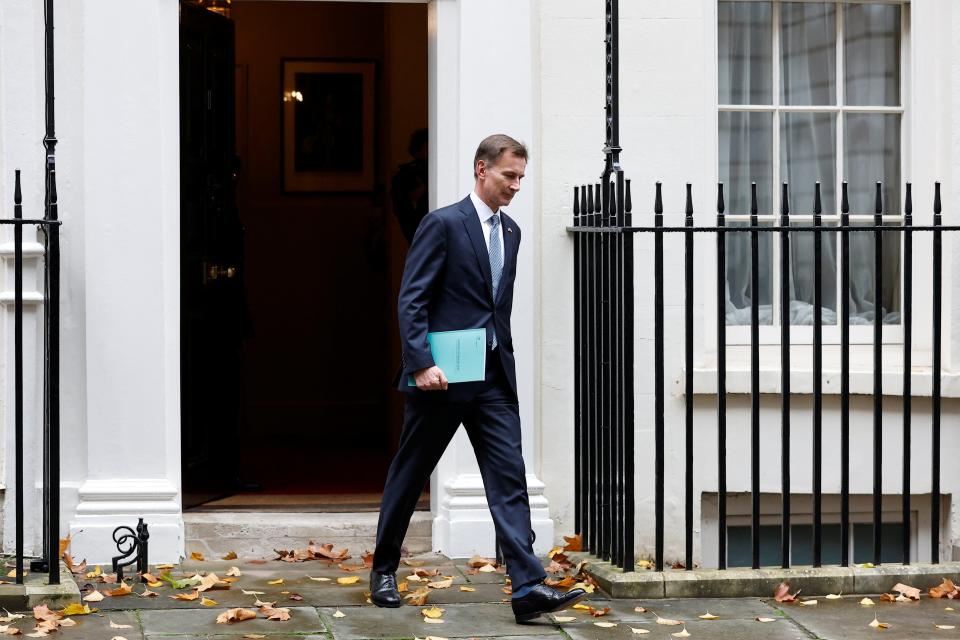
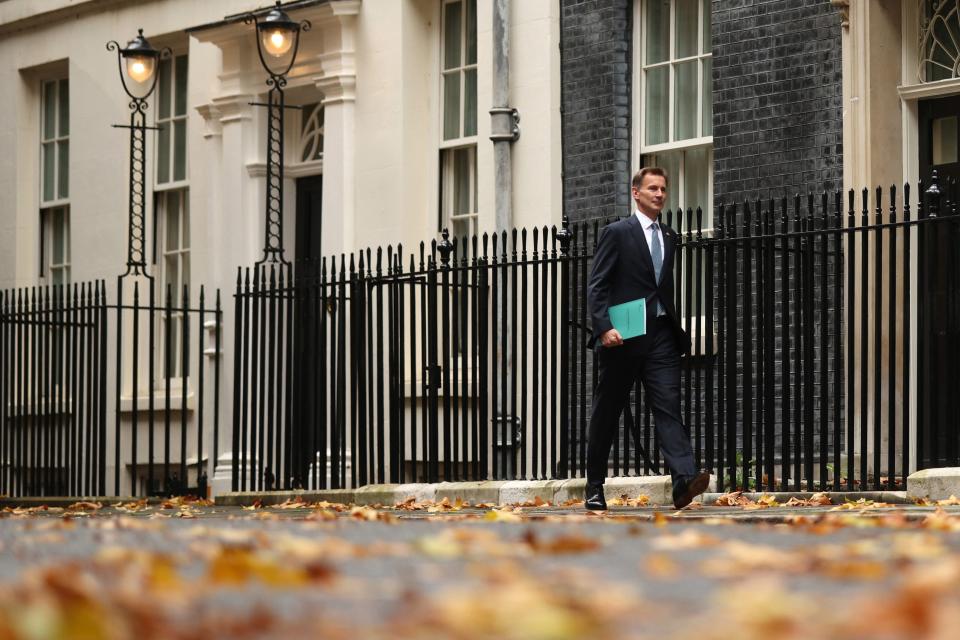
Sunak: Russia has shown barbarity in missiles on Ukrainian cities
10:36 , Josh Salisbury
Speaking in the Commons, Rishi Sunak has condemned Russian missiles raining down on Ukrainian cities.
Giving a statement on the G20 summit ahead of Mr Hunt’s Autumn Statement, he said: “Russia has show its barbarity and given the lie to any claim they are interested in peace.”
Referring to the explosion in Poland, he said it is possible that it was a Ukranian munition deployed in self defence. “Whether or not this proves to be the case, no blame can be placed on a country trying to defend itself. The blame belongs solely to Russia.”
SNP claims Chancellor making ‘political choice’ with likely spending cuts
10:16 , Josh Salisbury
The Chancellor does not bring in “austerity measures” because of “optimistic signs on inflation, the SNP has claimed.
Ian Blackford, the SNP Westminster leader, told Sky News: “I think it really brings into question a lot of the austerity measures that we know that the Chancellor is going to bring in today.
“He doesn't need to be doing this, it's a political choice as much as anything else."
The SNP MP called for windfall taxes on companies that "have benefited from high energy prices" and said a tax on share buybacks "would bring in £11 billion".
He added that the economy was "smaller because of Brexit" and that "we should be honest about its impact".
Cabinet meeting ends
09:57 , Josh Salisbury
Cabinet now appears to be over, with Prime Minister Rishi Sunak due to make a statement in the Commons at 10.30am on his recent attendance at the G20 summit in Bali, Indonesia.
Then the Chancellor’s statement will follow at 11.30am.
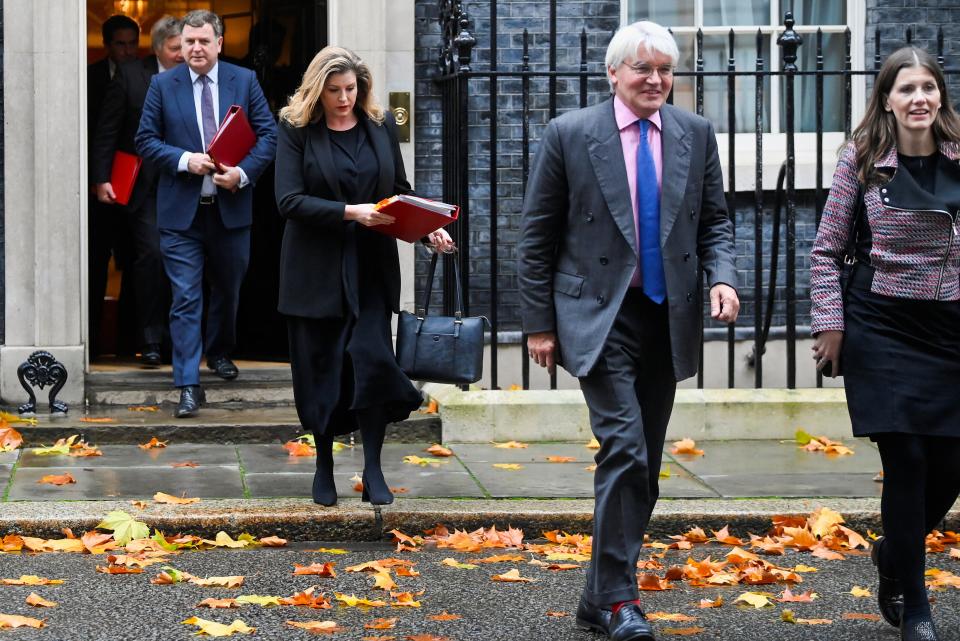
Sunak and Hunt ‘agree infrastructure spending to be largely protected’ - report
09:30 , Josh Salisbury
Rishi Sunak and Jeremy Hunt have privately agreed that infrastructure spending should be largely protected, according to the Times newspaper.
The pair are said to have agreed to protecting most capital spending in the statement, money which goes towards investing in public infrastructure such as transport, schools and hospitals.
The paper reports this is partly economic, and that Treasury officials believe that this is the best way to make the impending recession a shallow one.
Mr Sunak is also said to be motivated in part by a desire not to be seen to be abandoning pledges he made while Chancellor.
More Cabinet ministers arrive for meeting ahead of Hunt statement
09:21 , Josh Salisbury
More Cabinet ministers including deputy Prime Minister Dominic Raab have arrived for a meeting ahead of Mr Hunt’s Autumn Statement at 11.30.
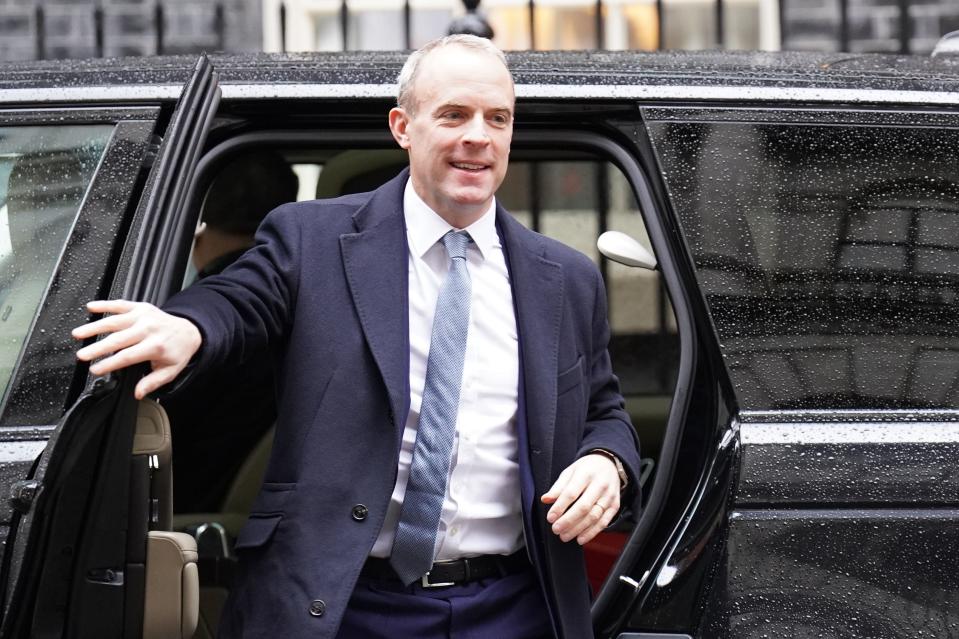
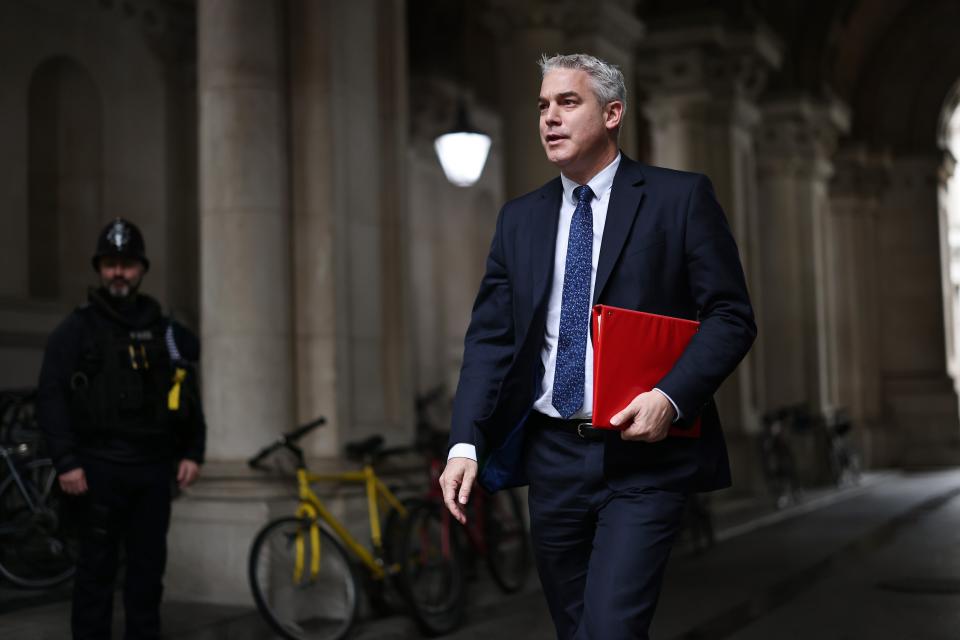
Spending cuts won’t work, says union leader
09:15 , Josh Salisbury
Frances O'Grady, general secretary of the Trades Union Congress (TUC), warned against the dangers of austerity.
Speaking on BBC Radio 4's Today programme ahead of the Chancellor's autumn statement, she said that tough spending cuts are "never easy for working people".
Ms O'Grady said that George Osborne's austerity plan had "failed", amid expectations that Jeremy Hunt will preside over similarly painful cuts of billions of pounds.
“We have been suffering weak growth as a country ever since, because it was killing the golden goose.
“If you are starving the NHS, our education and skills system, of funding that has an impact on the economy because we need a healthy workforce, we need educated, skilled and trained workers.
“Now we really need big investment in green infrastructure and our public services, if we're going to grow."
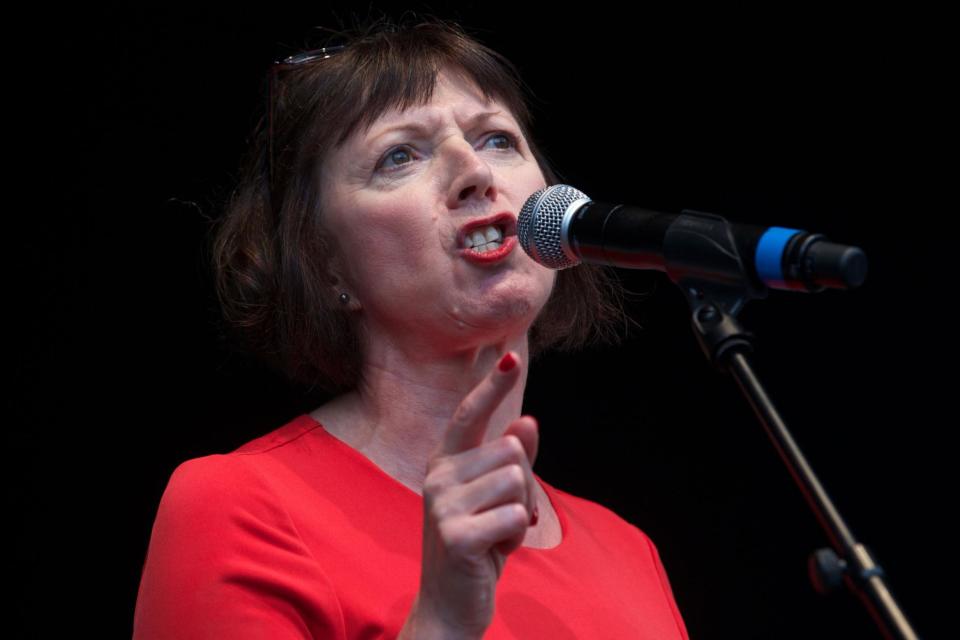
Labour: Country stuck in Conservative ‘doom loop'
09:07 , Josh Salisbury
Pat McFadden, Labour’s shadow chief secretary to the Treasury, said the UK was stuck in a “Conservative doom loop of emergency statements" and the Chancellor should begin his autumn statement today by "taking responsibility".
Mr McFadden said to Sky News: “I think he should acknowledge their responsibility for what's happened. I don't think he should pretend the mini-budget was just a bad dream."
The Labour MP said the Chancellor may have to "overcompensate" for the mistakes of Kwasi Kwarteng's mini-budget and would be "desperate to blame global factors" for the UK's poor economic outlook.
He said Labour's green prosperity plan would have to be funded "in part by borrowing", adding that there was a difference between "borrowing for unfunded tax cuts" and for "investments that will have a return for the future of the country".
Sunak pledges statement will ‘deliver stability’ in promotional video
09:05 , Josh Salisbury
In the Government's promotional video for the autumn statement, Prime Minister Rishi Sunak said: "Today's statement will help deliver the long-term stability this country needs."
Chancellor Jeremy Hunt said it would create a "stronger, fairer United Kingdom".
Business Secretary Grant Shapps said it would "support the most vulnerable with rising energy costs and asking energy companies to pay their fair share".
Education Secretary Gillian Keegan said investment would focus on "skills and ensuring the British people have access to greater opportunities".
Health Secretary Steve Barclay said it would "deliver on our promise of a stronger NHS and tackling the Covid backlogs".
Home Secretary Suella Braverman said the Government would "make our streets safer, support our security services and control migration".
The UK is facing the effects of the global economic crisis.
Difficult decisions need to be taken now to drive down inflation - the hidden tax eating into household budgets.
The Cabinet has set out why we are prioritising stability, growth and public services ⬇️ pic.twitter.com/VOUg5AMBeh— HM Treasury (@hmtreasury) November 17, 2022
Cabinet ministers arrive for meeting ahead of statement
08:51 , Josh Salisbury
Ministers have begun arriving for Cabinet ahead of the Autumn Statement.
Among the first to arrive is Chancellor of the Duchy of Lancaster, Oliver Dowden, alongside Environment Secretary Therese Coffey and Culture Secretary, Michelle Donelan.
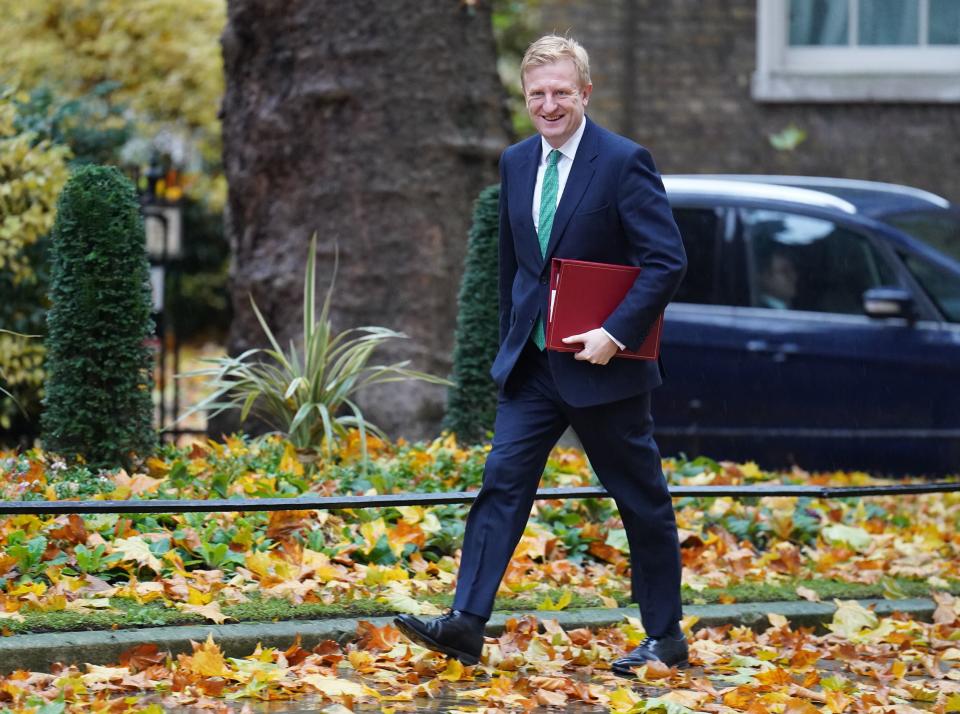
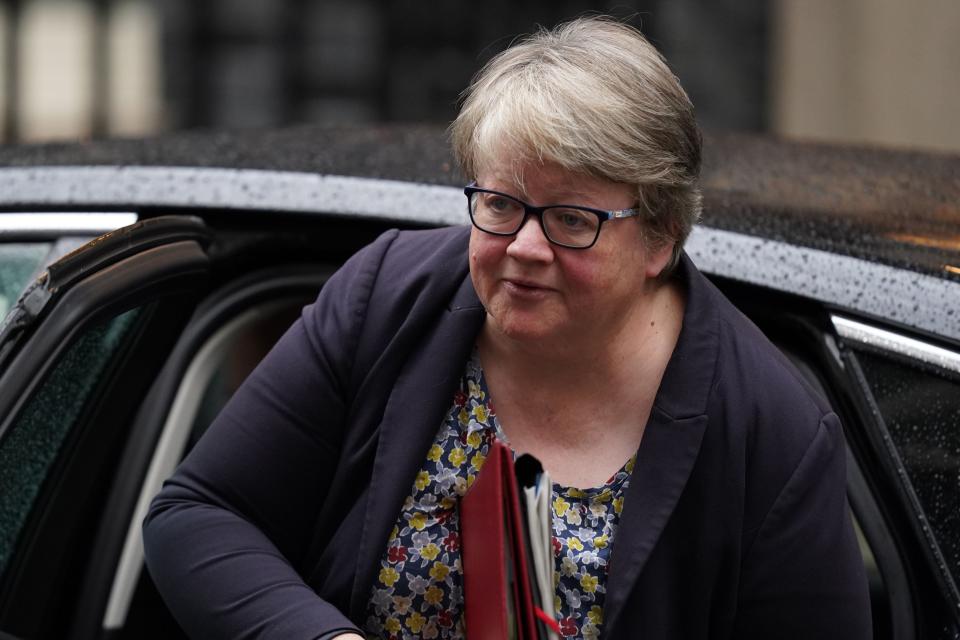
Tory MPs threaten to rebel over tax hikes
08:38 , Josh Salisbury
Some Tory backbenchers have already raised objections over planned tax hikes in the statement.
A group, led by MP Jonathan Gullis and including former Home Secretary Priti Patel and 1922 Committee chair Graham Brady, has written to the Chancellor asking him not to hike fuel duty.
Mr Gullis wrote: “My fellow MPs and I, want to see fuel duty cut to stimulate growth, but at least frozen at the current level for the lifetime of this Parliament.”
He added that the Government had benefited from high pump prices, with an estimated £3billion in VAT receipts in 2022.
Our full story can be read here.
Tory backbencher warns of ‘risk’ that statement could make looming recession ‘worse'
08:28 , Josh Salisbury
A senior backbench Tory MP has said he expects the statement to be “gloomy” and warned of a “real risk” it could make an impending recession worse.
David Davis, the former Brexit secretary, was asked on Talk TV if he expected any “good news”.
He said: “Not immediately, no. But I don't actually think he has got much choice.”
He told the broadcaster: "My expectation, frankly the biggest risk, put aside all of the gloomy news, it is all going to be gloomy this morning, you are dead right, there will be no rabbits, put aside that.
“The biggest risk is that what he is doing may make the recession that we are running into, all of Europe, all of the western world is running into, worse. That is the real problem, that is the real risk."
Labour: UK falling behind because of ‘Tory economic failure’
08:23 , Josh Salisbury
Labour’s Rachel Reeves, who will be giving a response in the Commons once Mr Hunt has made his statement, said the country is falling behind because of “12 years of Tory economic failure”.
She said: “We’re falling behind globally because of 12 years of Tory economic failure. Labour has a long-term plan to get our economy growing.
“It’s powered by the talent and efforts of millions of working people and thousands of businesses. It will be fairer, greener, and more dynamic.”
We’re falling behind globally because of 12 years of Tory economic failure.
Labour has a long-term plan to get our economy growing.
It’s powered by the talent and efforts of millions of working people and thousands of businesses.
It will be fairer, greener, and more dynamic. pic.twitter.com/kYI2Bso9Y4— Rachel Reeves (@RachelReevesMP) November 17, 2022
UK should expect some ‘pretty bad economic news’ - analyst
08:06 , Josh Salisbury
Torsten Bell, chief executive of the Resolution Foundation think tank, said he was expecting some “pretty bad economic news” ahead of the statement.
Mr Bell told Sky News the UK faced a “grim economic outlook", with the economy growing very slowly and "possibly ending this Parliament as weak as it began".
He added that this would be "much weaker than we were previously expecting". The head of the economic think tank said that he expected unemployment to rise, "which is the opposite of what we've been seeing in the recent past".
Mr Bell also added that tax rises would largely hit middle and higher-income households, but that lower-income households were seeing "the highest inflation rate right now and finding the cost-of-living crisis hardest to deal with".
What are the timings for the Autumn Statement?
08:03 , Josh Salisbury
Mr Hunt was initially scheduled to make his statement at 10.30am, but it will take place an hour later so Rishi Sunak can first make a statement about the G20 summit.
The Chancellor will first appear outside No 11 Downing Street at around 10.40am, before heading to the Commons where he is expected to make the announcement around 11.30.
The statement is expected to last around an hour, with supporting documents including the Office for Budget Responsibility’s (OBR) forecast published on the Government’s website.
Labour’s Rachel Reeves, the shadow Chancellor, will then deliver a response to the announcement. The OBR will then set out its workings in a presenation at 2pm, with the fiscal watchdog giving its assessment of the UK’s economic outlook.
Meanwhile, Jeremy Hunt do a round of sit-down interviews later today after his announcement where he will be grilled on its details.
Treasury Select Committee chair ‘pleased’ independent forecast to be released alongside statement
07:47 , Josh Salisbury
Harriett Baldwin, who chairs the Treasury Select Committee, said she was "pleased" the Government will be releasing an OBR forecast alongside its autumn statement today.
Ms Baldwin told Times Radio: “That's the number one thing that we've been calling for and we're pleased we're going to see it today".
The Conservative MP said the Treasury Committee hoped the Chancellor's statement would help the UK's "productive growth capacity", but that she does expect it to involve some "delays to infrastructure projects".
Ms Baldwin added that she expected more interest rate rises later in the year, but worried something had "gone wrong" in the Bank of England's forecasting models, "particularly around the tightness of the labour market".
Under the disastrous mini-budget in September, an OBR forecast was not prepared and released, which provoked controversy given the scale of the measures announced in the package which spooked the financial markets.
Pictured: Jeremy Hunt prepares Autumn Statement
07:43 , Josh Salisbury
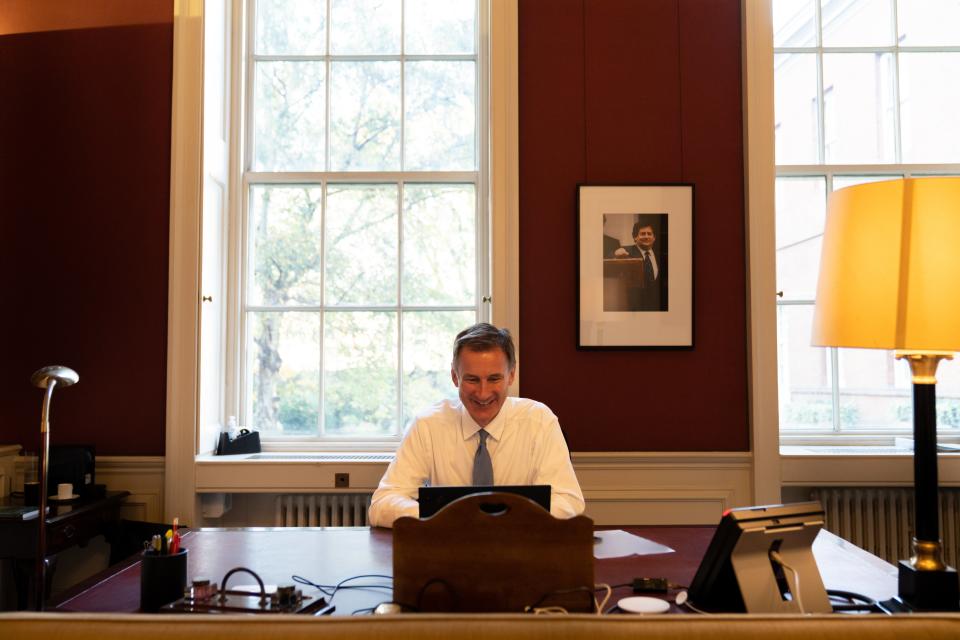
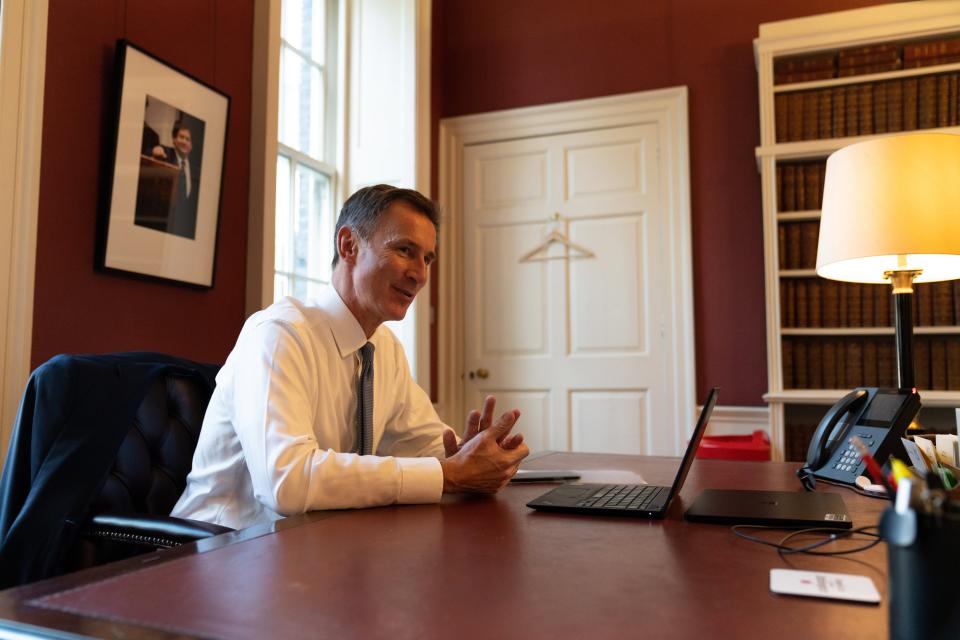
Energy windfall tax could increase
07:37 , Josh Salisbury
According to reports, Mr Hunt is preparing to hit electricity generation companies with a 40% windfall tax on their “excess returns”.
The Chancellor could announce a levy on the extra profits made by generators above a certain price per megawatt hour.
He is also said to have planned to raise the existing windfall tax on North Sea oil and gas operators, increasing the tax from 25% to 35% and extending it by two years until 2028.
Prime Minister Rishi Sunak had initially declined to introduce a windfall tax, but did so as Chancellor in May, under pressure from opposition parties.
What key areas will be addressed in statement?
07:27 , Josh Salisbury
There will be several key areas which Jeremy Hunt is expected to address in his Autumn Statement, all of which have an effect on the personal finances of millions of households.
Among them will be:
- Tax rises: Mr Hunt has already pledged that all of us will be paying more tax after the statement. He is expected to freeze the rates and which workers enter new tax brackets, which will draw more into higher rates of tax as inflation increases.
- Spending cuts: The plan is expected to include billions of pounds worth of cuts to public spending. However, the key details of where exactly these cuts will fall and which public services will be affected is not yet clear.
- Energy prices: Jeremy Hunt has already said that the Government’s Energy Price Guarantee, which provides support for the cost of energy bills, will be modified from April, and will not last two years in its current form as planned under Liz Truss. Exactly what support will come into place from then is expected to be revealed.
- Benefits: The Chancellor is expected to say whether benefits will be uprated with inflation, which currently stands at over 11%. It has faced pressure to make the commitment, and Rishi Sunak when he was Chancellor had previously backed the measure.
Why is the Autumn Statement taking place today?
07:07 , Josh Salisbury
Good morning and welcome to our live coverage as Chancellor Jeremy Hunt prepares to unveil a painful combination of tax rises and spending cuts in his Autumn Statement.
The statement is due before midday, although timings could change.
So what exactly is the Autumn Statement? Traditionally, the Chancellor unveils their budget in spring, and the Autumn Statement serves as an update six months later.
However, this Autumn Statement is delayed. It had been due to take place on Halloween after the disastrous ‘mini-budget’ under Liz Truss in September, which spooked the markets.
The new PM Rishi Sunak and Chancellor Jeremy Hunt pushed back the timing to mid-November.
It is widely expected to mean that we are all going to pay more tax and spending cuts are also on the cards to fix an reported ‘black hole’ in the public finances of up to £50-60bn.

